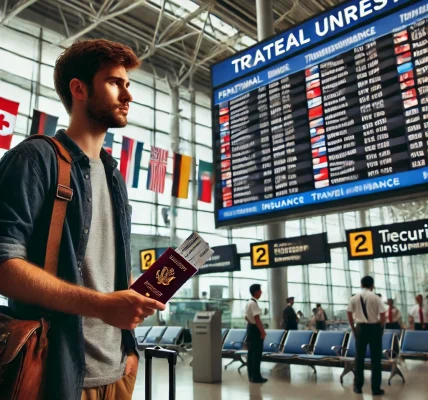Introduction
Traveling internationally is an exciting experience that opens doors to new cultures, cuisines, and unforgettable memories. However, along with the thrill of exploring new destinations, there are also potential risks—medical emergencies, trip cancellations, lost baggage, or unforeseen events that could turn a dream vacation into a nightmare.
This is where travel insurance comes in. It serves as a safety net, offering financial protection and peace of mind against unexpected travel mishaps. In this guide, we’ll break down why travel insurance is essential, how to choose the right policy, and key tips to ensure you get the best coverage for your needs.
1. What is Travel Insurance?
Travel insurance is a specialized policy designed to cover unexpected events that may arise before or during a trip. It provides financial assistance for medical emergencies, trip interruptions, lost belongings, and more.
A comprehensive travel insurance plan typically covers:
- Medical emergencies and hospitalization
- Trip cancellations and interruptions
- Lost, stolen, or delayed baggage
- Emergency evacuation and repatriation
- Flight delays and missed connections
- Personal liability coverage
Without travel insurance, you could be left paying significant out-of-pocket expenses if something goes wrong during your trip.
2. Why is Travel Insurance a Must-Have?
2.1. Medical Emergencies Abroad Can Be Costly
One of the biggest reasons to get travel insurance is to cover medical emergencies. Many countries have expensive healthcare systems, and treatment for accidents, illnesses, or hospitalizations can result in thousands of dollars in bills.

With a travel insurance policy, medical expenses—including doctor visits, hospital stays, and even emergency medical evacuation—are covered, ensuring you receive the necessary treatment without financial stress.
2.2. Protection Against Trip Cancellations and Interruptions
Life is unpredictable, and plans can change. Travel insurance can reimburse non-refundable trip expenses if you have to cancel due to:
- Sudden illness or injury
- Death of a close family member
- Natural disasters at your destination
- Airline bankruptcy
- Work-related emergencies

2.3. Lost or Delayed Luggage Compensation
Airlines lose or delay baggage more often than travelers realize. If your suitcase goes missing, travel insurance can compensate you for essentials like clothing, toiletries, and medication.

2.4. Emergency Evacuation & Repatriation
If you require emergency medical evacuation due to a severe health issue or accident, travel insurance covers the cost of transportation to the nearest hospital or back to your home country.

2.5. Flight Delays and Missed Connections
Unexpected flight delays due to weather, mechanical issues, or airport strikes can lead to additional accommodation and food expenses. Travel insurance reimburses these unexpected costs.

2.6. Legal Assistance and Personal Liability Coverage
If you accidentally cause injury to someone or damage property while traveling, personal liability coverage helps cover legal expenses and compensation.

3. How to Choose the Right Travel Insurance Plan
Step 1: Assess Your Travel Needs
Before purchasing travel insurance, consider: 



Step 2: Compare Coverage Options
Look for policies that include: 



Step 3: Check Policy Exclusions
Every insurance plan has exclusions. Common exclusions include: 



Step 4: Compare Insurers & Read Reviews
Not all insurers offer the same level of service. Choose a reputable provider with a strong claim settlement record and positive customer reviews.
Step 5: Understand the Claims Process
Before buying, check how to file a claim and what documents are required.
4. Pro Tips for Getting the Best Travel Insurance





5. Common Myths About Travel Insurance
 “I don’t need travel insurance for short trips.”
“I don’t need travel insurance for short trips.”

 “Travel insurance is too expensive.”
“Travel insurance is too expensive.”

 “I’m young and healthy; I won’t need it.”
“I’m young and healthy; I won’t need it.”

Conclusion
International travel is an amazing experience, but it comes with risks. Travel insurance is not just an added expense—it’s a smart investment in your safety and financial security.
Before your next trip, take a moment to research, compare, and purchase the right travel insurance policy. A few dollars spent on coverage today can save you thousands in unexpected expenses later.




